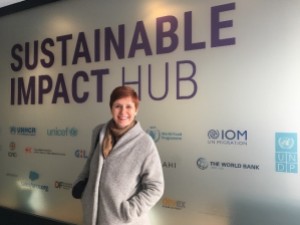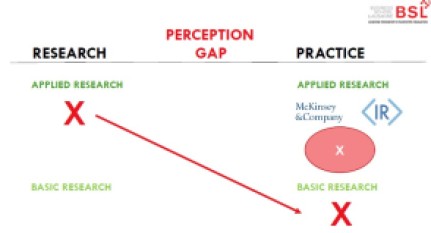Building personal resilience – an applied example
CEOs and HR Directors have consistently rated adaptability, authenticity and values as top leadership qualities for people at any level of an organization. These are also key ingredients for resilience. I define resilience as the capacity to respond to external pressure by adapting and recovering quickly and hence finding a new equilibrium.
Typically, we look at resilience in interaction with others in an organizational setting. I discovered last week, that I can apply these three ideas also in a challenging networking environment. As a way to launch our transatlantic blog into a new year, I wanted to dedicate this first blog to how we can build personal resilience while being in new challenging situations. I will demonstrate this with my personal experience and reflection from my first participation at the World Economic Forum (WEF) in Davos last week.
Arriving in Davos for the World Economic Forum was hard. Hard for different reasons than I had anticipated – it had been raining and the slush on the street made it a real challenge to make it to the AirB&B my colleague had organized for us. And yet, all this struggle was nothing compared to the difficulty we had securing accommodation for the event! Unimaginable! My colleague Julia Christensen Hughes, Dean of the College of Business & Economics at the University of Guelph , persisted through all obstacles and miraculously found for our Female Deans Trio a fabulous apartment.
Figuring out networking in an event that is strictly structured around privileged access to select events was another eye-opener. The weather challenge which drowned the arrival in unbelievable masses of snow and rain meant that nothing worked as planned. Being simply in the moment and helping fellow attendees out, together finding registration and queuing for badges ended up being the best way to connect. The human element of together making it in a challenging moment created a connection far more important than a typical cocktail party ever would. I may even have attracted a new MBA student to BSL as a result of one such incident.
Nesting in and finding spaces that feel comfortable was a big thing for me too. Given such unfriendly weather conditions outside made it a necessity to find warm and dry spots. Ideally with a seating option and a coffee machine nearby. So finding comfort in the welcoming Female Quotient equity lounge, felt perfect despite my initial resistance to join a “feminine” movement. Admitting that, listening deeper to my intuition and overriding superficial mental judgement, was important. The previous night, I had ignored such intuition and in an attempt to do some networking and meet up with friends, I ended up roaming the Promenade getting wet feet in the slush and maybe a cold along the way – without ever catching up with my friends. I did have the intuition that I should have stayed in the apartment and caught an early night, but failed to listen.
So what am I saying here? I find that when we reach out into the world as change makers, we end up in new, unfamiliar spaces where we need to orient ourselves and find out how we can be effective in such a space. Being effective, I suggest here with my brief insight into my brief #WEF2018 Davos experience, involves these three things:
- Adaptability: Arriving well and creating a space of comfort either by being with people or having accessories that create comfort (I always bring a candle when I travel)
- Authenticity: Being in the present moment and embracing the encounter that presents itself wholeheartedly without trying to be elsewhere – trust serendipity!
- Values: Listen to your intuition and go or stay where you feel well rather than where a program suggests you should or could be. Find your inner rhythm and stick with it as you dance with what is happening around and allow that duality with grace and joy!
And these three insights that I have gained in Davos link nicely back to what CEOs suggest are the backbone of resilience: adaptability, authenticity and values. I hope you find this reflection insightful in your own journey as a change maker both within your organization, and as you shape your own journey across new ground and landscapes!











 Author: Katrin Muff, PhD
Author: Katrin Muff, PhD
 Author: Dr. Kathy Miller Perkins
Author: Dr. Kathy Miller Perkins 




 Kate Raworth
Kate Raworth Kate was in Lausanne to inspire our graduating students along with
Kate was in Lausanne to inspire our graduating students along with  Kigen Moi
Kigen Moi Why not shake the hearts and minds of those stuck in the 20th century logic of the misinterpretation of Adam Smith’s invisible hand? Take a look at the state of the world, the state of any single country of your choice and you can clearly and without a single doubt see that the profit-maximization argument has gotten it wrong. We have spent the last decade trying to twist purpose and values-based arguments into the ill-fatted logic of the past century and we have gotten nowhere. If we want to change the mindset that Kathy Miller and I are trying to figure out how to change, maybe the time is now ripe to start talking the truth. Kathy ended her last blog with a deep insight of Mahatma Gandhi: “You must not lose faith in humanity. Humanity is an ocean; if a few drops of the ocean are dirty, the ocean does not become dirty.”
Why not shake the hearts and minds of those stuck in the 20th century logic of the misinterpretation of Adam Smith’s invisible hand? Take a look at the state of the world, the state of any single country of your choice and you can clearly and without a single doubt see that the profit-maximization argument has gotten it wrong. We have spent the last decade trying to twist purpose and values-based arguments into the ill-fatted logic of the past century and we have gotten nowhere. If we want to change the mindset that Kathy Miller and I are trying to figure out how to change, maybe the time is now ripe to start talking the truth. Kathy ended her last blog with a deep insight of Mahatma Gandhi: “You must not lose faith in humanity. Humanity is an ocean; if a few drops of the ocean are dirty, the ocean does not become dirty.”
 Katrin’s words reminded me of the teachings of Mahatma Gandhi. I immediately thought of the following quote which has been attributed to him:
Katrin’s words reminded me of the teachings of Mahatma Gandhi. I immediately thought of the following quote which has been attributed to him: Of course individual change without action is not enough. Gandhi claimed that we should act fearlessly, selflessly, with dignity and without violence. He, like Katrin in her May blog, reminded us that we must take action even if we don’t see immediate results. He believed that it is the action itself rather than the fruit of the action that is most important. And he wisely observed that even if we may not see the results of our actions, if we do nothing, there will be no results.
Of course individual change without action is not enough. Gandhi claimed that we should act fearlessly, selflessly, with dignity and without violence. He, like Katrin in her May blog, reminded us that we must take action even if we don’t see immediate results. He believed that it is the action itself rather than the fruit of the action that is most important. And he wisely observed that even if we may not see the results of our actions, if we do nothing, there will be no results.